|
Writing can often be a lonely task. No matter how passionate a writer is, it’s hard not to feel isolated sometimes when it’s just you and a keyboard. Once in a while, we need to step away from our characters and interact with real people. Luckily, there are plenty of options! Between clubs, literary magazines, events, and organizations, there is always something to participate in. Even as a scared freshman, it was so easy to get involved on campus. I have already had so many great experiences being apart of these clubs. So, if you ever find yourself in need of human interaction after hours of being hunched over a laptop, here’s some great options.
The most obvious club to begin with for Writing Arts majors is, of course, Writing Arts Club. Writing Arts Club is a place to share your work, foster creativity, and start new projects. Each meeting begins with a few writing prompts- sometimes poetry, sometimes short stories, but it is always encouraged to write whatever you want! There is so much freedom in this club, it’s really what you make of it. The goal in this club is to ultimately end the year or semester with a zine. A zine can be a work of fiction, poetry, or anything you desire. Last semester, we broke into groups based on what genre we were interested in, and worked on building one world together where each of our stories would take place. We discussed world building, character development, and plot throughout the semester. I learned new ways to world build through collaboration, considering aspects I hadn’t before. I specifically learned a lot about worldbuilding for modern magical worlds, something I hadn’t had experience in before. Character development we mostly did on our own, but we took turns updating our groups on progress and receiving feedback. As for plot, we took on the challenge of intertwining some of our plots since they all took place in the same world. Once the zines are completed, they are posted on the website. This semester, we are starting new projects and practicing our pitching skills. We have time to pitch concepts for our stories and receive feedback and advice from the rest of the writers. Writing Arts Club usually has a large amount of attendants- not so much that it’s overwhelming, but just enough for it to feel like a community. This semester, the Writing Arts Club meets every Tuesday from 6:30-7:45 in Bunce, room 304. Another club on campus that is perfect for writers is Avant Literary Magazine. Avant is the undergraduate literary magazine on campus, and Rowan’s second oldest club in history. The meetings are a little more structured compared to the Writing Arts Club, but relaxed nonetheless. The weekly meetings consist of going through manuscripts of submissions from the magazine. First we read them aloud, then critique, and after everyone votes to either accept or resubmit. Avant never rejects a piece of work, only suggests it to be resubmitted, because every piece can be improved! Through Avant, I’ve learned how to both give and take constructive feedback. Critiquing others’ work is also extremely beneficial to your own writing, as it might make mistakes you’ve also made more apparent. I’ve found that I am much better at editing my own work and identifying problems in it since joining Avant. There is so much great work that is submitted to Avant, and it’s always interesting to see what my fellow writers have been working on. Even if you don’t have interest or time in attending meetings, you can always submit your work through Avant’s email, [email protected]. If you are interested in participating in meetings too, Avant meets every Thursday this semester in Enterprise 417 from 7:00pm-9:00pm. If you’re interested in expanding your skills as a writer, and want to try your hand at journalism - The Whit would be a great fit! The Whit has been Rowan’s campus newspaper since 1983. They release weekly editions throughout each semester. Each edition includes events on and off campus, opinion pieces, arts and entertainment, features, sports, and more. Getting involved in The Whit is simple - all you have to do is email them with an idea of anything you want to write. The Whit is extremely welcoming and works with you to make your ideas happen. Going to the weekly meetings is not mandatory, so don’t worry if you can’t make it! Emailing back and forth is effective enough, and they’re always looking for new writers! Don’t be afraid to experiment a little and try writing in a new way. You will receive weekly emails from editors detailing what they need that week, and can either take ideas from that or offer your own. They are always supportive and open to new voices. Once you’ve written three pieces for The Whit, you are considered a staff writer. The Whit is both a physical and online newspaper- their website has all of their published articles and keeps you up to date on what is trending. If you’re interested at all, or have any questions, The Whit’s email is [email protected]. Throughout the semester, you can find all of these organizations at organization fairs, and some even host their own events! Avant, for example, often holds readings and even collaborates with Rowan After Hours for open mics. In fact, This Thursday, February 27th,Avant and RAH are holding an event from 9:00pm-1:00am at the Student Center. It will be a Coffee House Open Mic Night, the first event of the semester! In addition,The Writing Arts Club just sold poems for Valentine’s Day! There are always events going on, so don’t be afraid to come out. Being as involved as possible on campus will only make your experience better and benefit you in the future.
0 Comments
It was the spring semester of 2019. At the time, I was a junior in the Writing Arts Major. I got an email about a “4+1 B.A./M.A. Writing Arts Program.” After reading it over, I was interested, but worried if I’d be getting in over my head. A Master’s degree in only five years...should I pursue a Master’s degree? Will I be able to balance the heavier workload? What if it’s too hard? Looking back now, as I’m closing in on a year in the 4+1 Program, I know I made the right decision. But how does the program work, and what has been my experience so far?
The 4+1 program allows Writing Arts students to take graduate and undergraduate classes during their senior year as they work toward their Bachelors and Master’s degrees. As a senior, I’ve taken four graduate classes (two each semester) along with my undergraduate classes. These graduate classes count toward both my Bachelors and Masters degrees. This means I’m taking twelve fewer credits overall (four less classes). On top of this, I’m saving money! During my senior year, I’ve paid an undergraduate tuition rate for my graduate classes. Also, because I have already completed one year of graduate school as a senior, I only have one year of graduate school left! (that’s the +1) Less time in school means less money to pay after! To recap: the 4+1 program allows you to save time and money while pursuing a Bachelors and Masters degree. When I heard all this, I was hooked — I knew I had to apply. Writing Arts students can apply for this program during the spring semester of their junior year. When applying, you’ll submit a hard copy of the following: the application form, a short essay on why you want to enter the program, and two pieces of writing that you feel demonstrated your abilities as a writer in specific areas (such as creative writing, journalism, and academic writing). Also, two letters of recommendation will need to be submitted via email. All these documents will be submitted to the 4+1 Coordinator, Ronald Block, who reviews your application. Then, later in the spring semester, you’ll find out if you got accepted! This year the application is due before March 15th. Everyone has different reasons for applying to the 4+1 Program. Some may want to go to graduate school. The 4+1 would give them a head start and save them money. Some may apply because the career they are pursuing requires a Master’s degree. Or maybe they’re looking to challenge themselves in a demanding environment. The list goes on! For me, it was a combination of all these reasons. I knew that having a Master’s degree would benefit me in the long run, and doing it while I’m still in school, as opposed to returning to school later, seemed like the best option for me. In the future, I want to teach at the college level, and that requires at least a Master’s degree. My workload has increased sharply since joining the program, and balancing my classes is a challenge. In my experience and opinion, graduate classes require more time and responsibility than most undergraduate classes. In the first two semesters, I’ve had to learn how to manage the increased demands of these graduate classes while also taking my senior level undergraduate classes. I’ve improved my strategies of time management, organization skills, and kept an up-to-date planner to ensure I’m completing my assignments on time. There are days when I’m on campus for ten to twelve hours at a time for all my classes. Much of my free time is dedicated to school, more than ever before. Despite these challenges, I’ve gained so much from the program. The graduate classes have improved my abilities and expanded my knowledge of writing immensely. I’ve found a passion in creative nonfiction, one I might not have discovered had I not taken Special Topics in Nonfiction last semester. I also feel at home in these classes—everyone is a writer! It is a privilege to be among peers of great and passionate writers. I will carry the lessons I’ve learned and works I’ve produced long after my stay at Rowan has ended. I’m glad I made the jump into the 4+1 Program, and I know my future-self will be thankful I did. If you’re interested in learning more about the program or applying, click here to see the application instructions. Who are the Writing Arts interns? They are students, writers, creators, people who inspire the best in themselves and others. Take a moment to meet this semester’s interns! The newest additions to the Writing Arts department team are Tara Grier and Marissa Stanko. Both of them began their Writing Arts journey in the Fall 2019 semester. 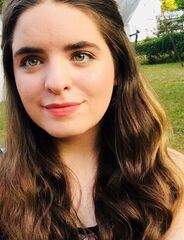 Tara Grier is a freshman hailing from Newark, Delaware. She has been in love with writing her whole life, and is the author of a book she says is part of a fantasy series she envisions completing. Tara and Writing Arts are a perfect match: “Rowan’s Writing Arts program was so different compared to other programs I’d seen, and that’s why I decided to come here.” She wants to experiment with shorter prose and poetry in the time she is not busy with various clubs on campus--Tara is an involved member of Avant, the Writing Arts Club, and the Whit. Although she has not yet decided her specialization, Tara is interested in putting her editing and leadership experience to use in the Publishing and Writing for the Public focus. Tara’s passion for getting involved led her to join the department. During her time in the Writing Arts Learning Community, Tara learned about and pursued the opportunity to become a Writing Arts intern. She says she is “most looking forward to strengthening my skill as a writer, but also learning new skills I do not have experience in yet such as video editing, interviewing, and helping with the podcast!” Tara has a favorite quote that reflects her affinity for writing: “After nourishment, shelter and companionship, stories are the thing we need most in the world.” - Philip Pullman 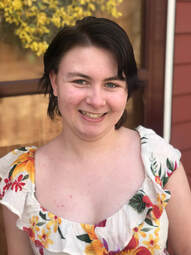 Marissa Stanko transferred to Rowan Writing Arts from Salem Community College. She started as a junior, and she is enjoying all of the new techniques she is learning at Rowan. “This semester my classes have really focused on shorter pieces, which I love,” she says. “I’m working on a longer piece on my own as well. Having a space to write is really valuable to me.” Marissa discovered Writing Arts in 2017. After her first semester, Marissa changed her major from Biology/Chemistry to Liberal Arts in order to take as many writing classes as she could. She cites friend, mentor, and Writing Arts alumna Jorie Rao as her inspiration for applying to Rowan. Her decision to become an intern was instant. After seeing a post on Instagram asking for applicants, Marissa interviewed and joined the team a week later. She is thrilled to learn new digital skills during her internship that will be relevant in her desired field of higher education. Marissa values her community and is a member of her local Ladies’ Auxiliary, in addition to volunteering at her community college. Marissa loves to write romance, comedy, contemporary fiction--whatever strikes her fancy. Although fiction and poetry are her preferred formats, she is taking a class in creative nonfiction to explore other kinds of writing. Her favorite writing quote is “A story must be told or there’ll be no story, yet it is the untold stories that are most moving”, by J.R.R. Tolkien, whom she names as her favorite author and “the master or fantasy”. Returning to the Writing Arts team this semester are Matt Berrian and Connor Buckmaster. 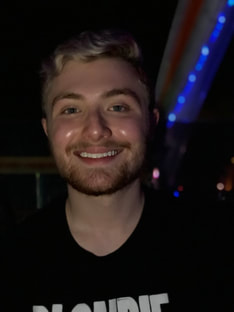 Matt Berrian, a sophomore in the Creative Writing specialization, chose Rowan Writing Arts for its uniqueness--he says “Writing Arts was actually the reason why I committed to Rowan.” He moved from the North-Central region of New Jersey to pursue writing in all of its formats. Matt is a member of Rowan’s Avant Literary Magazine and Prism an organization dedicated to diversity, something Matt seeks in his studies and appreciates about Rowan. Currently, Matt is exploring flash-fiction and poetry. According to him, “there’s something so alluring [to me] about art that’s concise but still packs a punch.” He became an intern despite some apprehension. His internship has helped him overcome stress and anxiety in workplace settings, which augments his writing career as well. Matt is excited to be working on an upcoming article covering mental health in creative minds for the Writer’s Insider blog, and a Marvel pop-culture essay in one of his classes. Matt’s favorite writing quote: “Stories may well be lies, but they are good lies that say true things, and which can sometimes pay the rent.”― Neil Gaiman  Connor, from Washington Township, is a veteran in the Writing Arts department; this is his second semester serving as the head intern. He is exploring nonfiction in a graduate class, an opportunity available to him as part of the 4+1 Program, where he can take undergraduate and graduate courses simultaneously to complete his degree faster. He also writes poetry when he feels inspired. As a new member of Avant and a tutor in the Writing Center, Connor is soaking in all the writing Rowan has to offer. For him, this is the opportunity of a lifetime, and the reason he chose Writing Arts: “I’ve had a passion for creativity and writing all my life, so deciding to major in Writing Arts was an easy decision. I wanted to challenge myself, to improve my craft, and to meet other students passionate about writing. I’ve learned so much about myself through the program.” In tandem with his current writing endeavors is his favorite quote: “If it is art, it is not for all, and if it is for all, it is not art.” — Arnold Schoenberg Together, these four individuals suggest a promising future for the Writing Arts department. Read this blog and check out the RU Writing podcast on Spotify to keep up with their work!
 Towering trees, cool breezes, and blank pages. As it turns out, this proves to be the best recipe for creativity. On January 10th-13th, Rowan held its first Writing Arts Winter Writing Retreat. Students who participated in this retreat had the opportunity to engage in writing workshops with professors and authors, share their own work, receive feedback, and speak to an executive editor. All the while, students were staying at a beautiful retreat center, Pendle Hill. Pendle Hill felt like it earned its reputation as a retreat site before the first night of my stay was over. The campus was homey, with enough snaking pathways and eclectic landmarks to pull my legs into a tranquil roam in-between workshops. Aside from a welcoming exterior, Pendle Hill’s hosts were warm and gracious people who would bring with them an air of calm wherever they appeared. The retreat proved to be extremely successful. We were lucky enough to be joined by Dr. Jade Jones, Professor Megan Atwood, Lanre Akinsiku, and Professor Heather Lanier. Each of the professors worked tirelessly to grant us both an educational and inspiring experience. While the modern world may offer a variety of amenities to appreciate, the never-ending flow of information that comes with such amenities often results in a chronic case of distraction and disengagement from the present moment. Pendle Hill’s seclusive campus opened up its arms for all of us students who were looking for a reprieve from the world’s constant noise. Here came a small community of like-minded students and instructors who, for a brief moment in time, leaned on each other and the world around them to do one simple thing: write. Poetry Workshop - Tara I went into the Poetry workshop without much experience in the genre. I have never been great at poetry, and for that reason I haven’t written a lot of it. However, I decided that the only way to improve is to practice it. The only issue was I didn’t know where to start. I knew the Poetry workshop would both challenge me and give me the foundation I needed to begin writing more of the genre. In the workshop, we discussed a form of poetry known as persona poetry. Professor Laneir did a great job of explaining what they were and the different ways they can be written. We then read a few different examples of persona poems, analyzing the meaning behind them as we did so. Among some of the pieces were "Monica Lewinsky Thinks of Bill Clinton While Standing Naked in Front of a Hotel Mirror" by Julianna Baggot and a collection of poems from Patricia Smith’s “Blood Dazzler”. After reading examples of this poetry, we were given the task of writing our own pieces. With the guidance given, I had a much stronger idea of what I wanted to write. After choosing a topic, I began to write, and ended with a poem I was proud of. I think the workshop was helpful to both experienced poets and those like me, who were hesitant to write poetry. I certainly gained a lot from this workshop, and hope to continue working on my skills as a poet. Fiction Workshop - Matt Choosing between the Fiction and Creative Nonfiction workshops was a challenge, but after considering the creative nonfiction work that I had just completed in my Fall 2019 Creative Writing II course, I decided that touching up on my fiction writing skills should probably be what I focused on. Professor Atwood led the fiction workshop, and used her experience as both an author and an editor to help all of us in the room become better at presenting our stories in a way that was engaging and dynamic for future readers. Through different writing exercises given to us during the workshop, we practiced how to see the world in our characters’ eyes; how to create narrative arcs propelled by character development; and how to effectively use world-building methods to provide a reliable spine to your storytelling. I appreciated all of these lessons, but what stuck with me the most was our lesson on the relationship between plot and character. Professor Atwood argued that there is no distinction to be made between plot and character in fiction, because all plots should be actively shaped and interrelated to the desires and flaws of your characters. While I have been advised against creating passive characters who are strung along by the demands of the plot, I have never had an instructor claim that plot and character are not meant to be treated as separate entities. I’ve taken this thought to heart since, and will carry this nugget of wisdom into all of my future projects as a writer. Q&A With Jordan Brown- Tara: One of the most informative and beneficial aspects of the retreat was definitely the opportunity to speak to executive editor, Jordan Brown. Brown works for two imprints of Harpercollins Children’s Books, and his significant amount of experience left students feeling both excited and nervous as we anticipated what he might have to say. Something Writing Arts majors hear frequently is “How are you going to make money?”, and Jordan Brown is an excellent example of how we could use our Writing Arts degree. He first gave us a better idea of what he does day to day. Then he went on to answer some of Professor Atwood’s prepared questions. Afterwards, there was a brief Q&A. We were able to learn about what an editor’s day-in-the-life looks like, how editors begin as assistants, what editors look for in a manuscript, and the process it takes if it is accepted. Brown was extremely knowledgeable and his insight was appreciated by all. Many students jotted down notes as he talked, knowing the information would be useful later. Seeing someone who is passionate about literature and writing just as we are, someone who has been able to make their life about stories, was an inspiring and motivating experience. Group Workshops - Matt One aspect of the retreat that felt incredibly affirming and positive for me was my experience in a group workshop on the retreat’s final day. While my English teachers have usually given me kind remarks on my creative writing, I’ve always harbored an anxiety that other people who wrote creatively or who were in a position to judge me as a peer and not a student would not receive my work well. Reading an excerpt from a short science-fiction piece I had drafted was a nerve-wracking hurdle I knew that I needed to clear to receive the type of feedback from the type of audience I needed to hear from. To my relief the group members had positive things to say about my draft, including Professor Atwood -- a published author herself. After I shared my piece, the other three students in the room went around and read what they had been working on as well. What I was expecting to be a critical takedown of everyone’s work actually turned out to be a welcoming group of people willing to support each other’s efforts and who encouraged bringing positive energy into one’s creative space. I know that there are some people who see affirmations and compliments as coddling diversions that obstruct “real” internal progress, and I also know that I have been guilty of adopting this mindset every so often. But -- as someone who so habitually derides his own efforts -- I think that the group confidence-boost was exactly what I needed to further hone my writing ability.  Final Thoughts: The Winter Writing Retreat ended with an early breakfast and a little over a dozen temporary goodbyes. While the retreat had only lasted about three days, many students were already sharing their hopes that another writing retreat would be offered for the upcoming semester as well. It can be slippery trying to quantify a “success” when it comes to writing -- even more tricky when trying to tell whether an event about writing was successful or not. But the passion for writing was definitely there in every workshop, and every student was willing to engage with and respond to whatever the professors threw at them. The Writing Arts department’s first writing retreat set a clear standard for how future retreats can measure their success. Hopefully this little Pendle Hill excursion will be the first of many more opportunities for Writing Arts students to disengage from their daily stresses and instead find a safe haven to let their writing grow. |
Archives
May 2024
Categories |
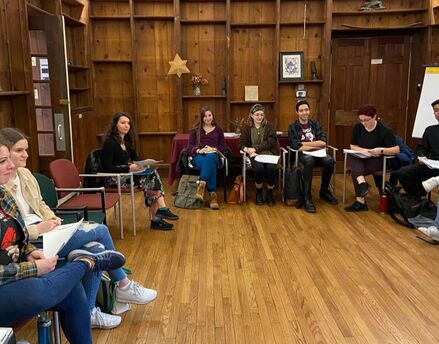
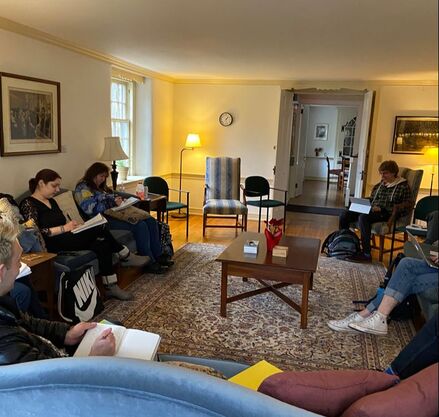
 RSS Feed
RSS Feed